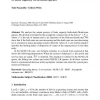Free Online Productivity Tools
i2Speak
i2Symbol
i2OCR
iTex2Img
iWeb2Print
iWeb2Shot
i2Type
iPdf2Split
iPdf2Merge
i2Bopomofo
i2Arabic
i2Style
i2Image
i2PDF
iLatex2Rtf
Sci2ools
QUESTA
2008
2008
The asymptotic variance rate of the output process of finite capacity birth-death queues
We analyze the output process of finite capacity birth-death Markovian queues. We develop a formula for the asymptotic variance rate of the form + vi where is the rate of outputs and vi are functions of the birth and death rates. We show that if the birth rates are non-increasing and the death rates are non-decreasing (as is common in many queueing systems) then the values of vi are strictly negative and thus the limiting index of dispersion of counts of the output process is less than unity. In the M/M/1/K case, our formula evaluates to a closed form expression that shows the following phenomenon: When the system is balanced, i.e. the arrival and service rates are equal, vi is minimal. The situation is similar for the M/M/c/K queue, the Erlang loss system and some PH/PH/1/K queues: In all these systems there is a pronounced decrease in the asymptotic variance rate when the system parameters are balanced. Keywords Queueing theory
| Added | 28 Dec 2010 |
| Updated | 28 Dec 2010 |
| Type | Journal |
| Year | 2008 |
| Where | QUESTA |
| Authors | Yoni Nazarathy, Gideon Weiss |
Comments (0)

